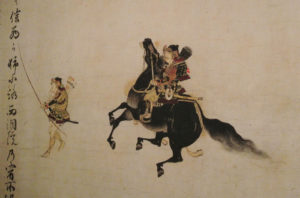
Many of the initial readers of The Samurai focused on its sense of adventure, where a low-ranking Japanese samurai (think knight, for those of you less familiar with medieval Japan) travels to Mexico, Spain, and ultimately even Rome in the hopes of developing trade between Japan and Spain.
And who can blame them? Adventure tales are adored for good reason—oceans are traveled, mountains are crossed, rivers are forded—they grab hold whether every pebble passed is described in delightful detail or whether whole swathes of the journey are memorably glossed, like an Indiana-Jones-style-line traversing a colorful map.
The stakes are also high in this historical adventure: in early 17th century Japan, the low-ranking samurai and three other envoys are ordered by their feudal lord—the Shogun—to voyage to Nueva España (Mexico) to open trade relations between Japan and Spain. This goal is more difficult to achieve than first surmised, however, and the envoys journey to Spain and even Rome before they can begin to return home. In the meantime, tumultuous seas, harsh deserts, Indian uprisings, and political machinations have to be endured, all made worse by their dependence on their translator, a wily Franciscan monk who may or may not have their best interests in mind.
Now, it can’t be denied that this is one appeal of The Samurai, but selling it as an adventure tale only captures a portion of it. While there is pageantry and drama to spare in a journey that takes years to finish, the real strength of The Samurai lies in its focus on the individual.
The novel’s main character, the titular samurai, is the overlord of a tiny fiefdom of three villages, surrounded by marshland. Lesser writers would struggle with making such a man’s life interesting, yet Endo makes Hasekura Rokuemon’s existence beautiful in its desolation. Rokuemon looks like the peasants that work in the three villages he rules, and he works just as hard as they do—he is not one of those idle samurai with time to paint or write poetry. The only music is that which can be found in a harsh life of labor:
It began to snow. Until nightfall a faint sunlight had bathed the gravel-covered river bed through breaks in the clouds. When the sky turned dark, an abrupt silence ensued. Two, then three flakes of snow fluttered down from the sky. As the samurai and his men cut wood, snow grazed their rustic outfits, brushed against their face and hands, then melted away as if to underscore the brevity of life.
Endo’s writing consistently reminded me of Japanese woodcuttings and paintings, with their clear black lines and sharp colors that imprint even simple scenes with a vividness that cannot leave the eye.
All too soon, Rokuemon is torn away from this world that he cherishes, leaving his ailing uncle, wife, and small children behind. While the ache of this never leaves Rokuemon, it is tempered with the joys he takes in the journey—the broad expanses of the sea, the tableaus and cacti of Nueva España, the immense cathedrals of Spain itself—all are colored by the simple delight Rokuemon takes in the them.
Nor is simple a derogatory adjective when applied to Rokuemon. While he wishes he were wily and canny, like one of the other envoys (or the Shogun, who sent him on the diplomatic mission), he knows he isn’t. All he can offer his steadfastness, his loyalty, his ability to work.
The beauty of the samurai’s simplicity and steadfastness is heightened all the more by being surrounded by schemers. It’s unclear if the Shogun truly wishes to establish trade relations and encourage Christianity (which he has recently begun to persecute), or whether he wishes to gain something else from the mission. And while the Franciscan monk who accompanies the envoys is aware of this possible duplicity, he is also willing to go along with it, all for the sake of Japan’s soul: if Christianity can only take root, it will be worth it.
This Franciscan monk, Father Velasco, is the other individual at the heart of the novel. Like the samurai, he comes from a warrior’s family, but unlike the samurai, he is a cunning manipulator. He truly wishes to help Japan, but his mind and ego constantly get in the way of his more noble intentions. He needs to be the one to save the Japanese, not the rival order of the Jesuits. He is the only one who understands the Japanese and can lead them to salvation, no one else.
If Rokuemon is made wonderful by his honest simplicity, Velasco is made relatable by this struggle. He is consistently told by church leaders that there is no hope for Japan—the Shogun most certainly will continue to persecute Christians, as he has been for the past several years. But Velasco won’t give up; he feels responsibility for all the Japanese Christians and martyrs. He has faith where other church leaders do not, and his belief continues while the Pope falters in the face of international politics and declines to pressure Spain into trading with Japan (or continue to send missionaries to Japan). While Velasco’s actions are at times tainted by pride, faith is at their root, not sin.
These two individuals—samurai and priest—eventually find themselves united in their faith against the mammoth institutions they represent. After years of traveling for his Shogun, Rokumon returns to Japan to find Christianity wholly outlawed. Unfortunately (or not so unfortunately?), he was baptized in Spain, for the sake of his mission and his Shogun. As a result, he is viewed with greater and greater suspicion by the authorities, no matter why he became a Christian.
That’s the great tragedy as well—he didn’t particularly believe in Christianity during his journey. He couldn’t understand how people could worship a broken man on a cross. That man wasn’t noble or lordly, like the Shogun. But in his persecution, he begins to understand and believe. The Shogun doesn’t understand or care for him, nor do the other high-ranking samurai who express sympathy for Rokuemon’s situation but do no nothing else. They aren’t the ones who are eventually jailed or executed.
As for Velasco, he ignores the orders of the Pope and returns to Japan, fully aware he could be executed for preaching there. Inevitably, he is captured, and he learns of Rokuemon’s execution before being martyred himself: it is a seemingly bleak ending, looking at those facts. But in the willingness of these two to go against the inertia of their respective leaders and organizations, it is a moving picture of hope.
The Samurai is one of the best evocations of faith I’ve read from an author of the modern era, but even if this doesn’t appeal to you, Shusaku Endo’s portraits of these two very human individuals should. As this world of ours is more and more characterized by its monolithic institutions that too easily forget the people that make them up, this novel’s embrace of that which makes us human is something all the more to value.


